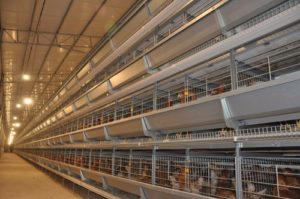Summer is the period of high incidence of animal diseases, and raising layer chicken in cages are also entering the stage of frequent epidemics. Layer chicken are small in size, have low immunity. They are more likely to be sick than other animals. Therefore, it is very important to do a good job of epidemic prevention of laying hens. Let’s learn more about it: what to pay attention to when raising layer chicken?
- Pay attention to the law of increasing laying rate of layer chicken and strengthen the feeding and management of layer chicken.
The high temperature in summer reduces the feed intake of the layer chicken. Therefore, breeding managers must conscientiously do a good job in the daily feeding and management of the layer flocks, and must ensure the supply of high-quality, balanced nutrition, and fresh and sufficient feed for the layer chicken, especially the layer chicken in the peak period of laying. Ensure the absolute safety of water quality and water sources. And ensure that the layer chicken have sufficient drinking water, so as not to affect the performance of egg production.
- Pay attention to the influence of temperature on the production of chicken eggs, correctly handle the contradiction between heat preservation and ventilation, and pay attention to light management.

In summer, the heat source of the chicken house not only comes from the heat it emits, but also the influence of high temperature. When the temperature of the chicken house is higher than 32 degrees, the ventilation management must be strengthened to adjust the number of fan switches and the size of the vents in time to meet the needs of ventilation and achieve the purpose of adjusting the temperature. At the same time, pay attention to the management of the light time and care intensity of the chicken house. The light time of the layer chicken should be stable at 16 to 16.5 hours. It is recommended to turn on the lights from 5:00 to 6:00 in the morning and turn off the lights from 9:00 to 10:00 in the evening. The appropriate intensity is 10 lux. The bulb is recommended to be wiped once every one to two weeks to maintain the light intensity.
- Pay attention to the law of antibody growth and decline in layer chicken, and do a good job in immune disinfection.
High summer temperatures are more likely to breed bacteria and viruses. Laying hens are more prone to outbreaks of a series of diseases, which can cause irreversible effects on laying eggs. Therefore, we should pay attention to the law of the growth and decline of antibodies in laying hens, and make timely supplements and immunizations to maintain the stability of laying eggs. According to the specific situation of the chicken farm, develop a detailed immunization program, and insist on completing the immunization to maintain the quality.